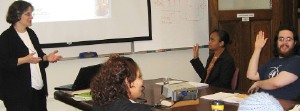Oct 29 2008
The Institute for NanoBioTechnology (INBT) at Johns Hopkins University strives to be integrative and multidisciplinary. With 170 faculty and more than two dozen graduate students and undergraduates with backgrounds as diverse as physics and computational medicine, the institute has sought to broaden skills and foster collaborations among its student body and its faculty members. That collaboration now extends to the relationship between science and the mass media through a course called Communication for Scientists and Engineers, which aims to give INBT's graduate students hands-on experience in learning how to communicate complex ideas to non-technical audiences.
 Gail Porter presenting during the 2007 intersession course “Science writing for scientist and engineers“. Credit: Mary Spiro/JHU
Gail Porter presenting during the 2007 intersession course “Science writing for scientist and engineers“. Credit: Mary Spiro/JHU
Spiro, course instructor and science writer for INBT, knows first hand the important relationship and possible misunderstanding that can occur between scientists and the media.
Scientific ideas, though important for the public to know, are sometimes hard to comprehend or may seem irrelevant to interests of the non-scientist, Spiro explains, and this can make it difficult to convey the significance of scientific investigation to those not engaged in it.
"On the other hand, journalists are looking for novel stories, are under tight deadlines and may have an inaccurate view of the length and complexity of the scientific process," Spiro says. "Reporters want to hear about the next breakthrough."
Although the course is not aimed at training INBT's graduate students to work as reporters, the overall goal is for them to "gain an appreciation for the importance of communicating scientific ideas clearly and to learn a few tools to successfully do that," she says. With her formal training as both a journalist and a scientist in mind, Spiro designed the course for science and engineering graduate students to understand the basic components of the media such as "learning how to write a press release, giving a press conference, and interviewing each other."
Spiro taught a course in science writing for scientists and engineers during the January 2008 Intersession. In January 2009, she will teach a new course that focuses on communicating science through video production, requiring students to work in front of and behind the camera. Spiro hopes that in addition to the writing skills the students develop for communicating their ideas to the public, the focus on video in this new course will add a "different dimension to communicating science," and highlight an additional medium that scientists can use to advance their scientific ideas to the public.
Public relations experts and media professionals also speak to the class. Guest speakers in 2008 included Davide Castelvecchi from Science News; Gail Porter, director of public and business affairs at the National Institute for Standards and Technology; and Joann Rodgers, director of Media Relations and Public Affairs for Johns Hopkins Medicine.
Graduate students in INBT's fellowship programs are required to take at least one of Spiro's science communication courses, either the writing course or the video course. This training is considered part of their professional development training. A few of the student articles written during the 2008 science writing course have been posted to INBT's Web site (see below). Spiro plans to have work produced during the course on video news releases to be posted by spring 2009.
Examples of student writing include:
- Water: More than just a drink.
- Nanoparticle clusters offer surprises for physical chemists.
Story by Jacob Koskimaki, INBT science writing intern and NanoBio IGERT fellow